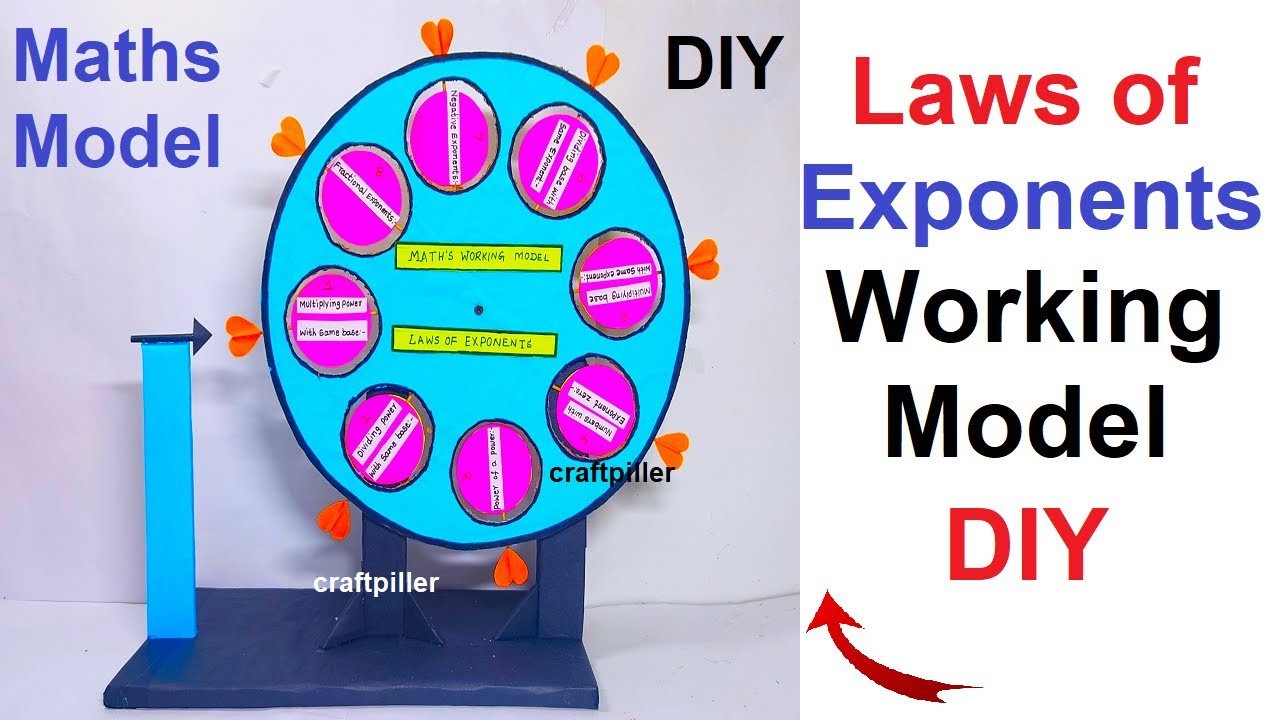Creating a working model of the laws of exponents using a spinning wheel can be an interactive and engaging way to understand and demonstrate these mathematical principles.

Here’s a step-by-step guide along with definitions and examples:
Materials Needed:
- Cardboard or wooden base (for the spinning wheel)
- Color papers
- Labels or markers
Step by Step Procedure of making Maths TLM
Step 1: Create the Spinning Wheel Base
- Construct a circular wheel using cardboard or wood. Attach a wooden dowel or PVC pipe through the center to serve as the axis of the wheel. This will allow the wheel to spin freely.
Step 2: Attach Buckets
- Attach small circles around the edge of the wheel
Step 3: Label the Buckets
- Label each bucket with a specific exponent and base.
Working Model Explanation:
- Definition of Exponents:
- Explain that exponents represent how many times a number (base) is multiplied by itself. For example, in “a^n,” “a” is the base and “n” is the exponent.
- Laws of Exponents:
- Product Rule: a^m * a^n = a^(m+n)
- Show this law by placing a certain quantity of small objects (representing “a”) into two buckets labeled “a^m” and “a^n.” Spin the wheel, and combine the contents into a single bucket labeled “a^(m+n).”
- Quotient Rule: a^m / a^n = a^(m-n)
- Place a quantity of small objects in a bucket labeled “a^m,” and another quantity in a bucket labeled “a^n.” Spin the wheel, and transfer the contents to a bucket labeled “a^(m-n).”
- Power Rule: (a^m)^n = a^(m*n)
- Place a quantity of small objects in a bucket labeled “(a^m).” Spin the wheel, and transfer the contents to a bucket labeled “a^(m*n).”
- Product Rule: a^m * a^n = a^(m+n)
Examples:
- Product Rule (a^2 * a^3 = a^5):
- Place a certain quantity of small objects in a bucket labeled “a^2” and another in a bucket labeled “a^3.” Spin the wheel, and transfer the combined contents to a bucket labeled “a^5.”
- Quotient Rule (a^4 / a^2 = a^2):
- Place a quantity of small objects in a bucket labeled “a^4” and another in a bucket labeled “a^2.” Spin the wheel, and transfer the contents to a bucket labeled “a^2.”
- Power Rule ((a^3)^2 = a^6):
- Place a quantity of small objects in a bucket labeled “(a^3).” Spin the wheel, and transfer the contents to a bucket labeled “a^6.”
By demonstrating these examples using the spinning wheel model, students can actively participate and visually see the laws of exponents in action. This hands-on approach makes the concept more tangible and memorable.

